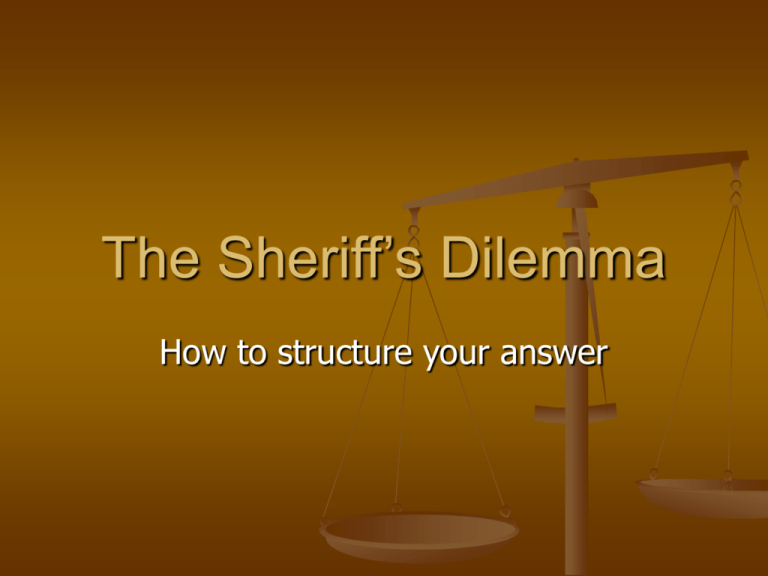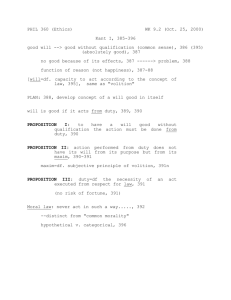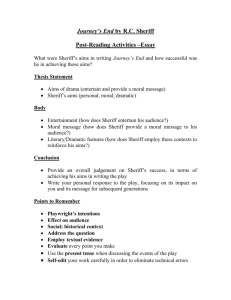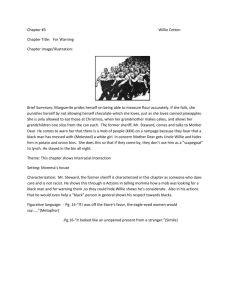The Sheriff's Dilemma
advertisement

The Sheriff’s Dilemma How to structure your answer The Sheriff’s Dilemma It is 1873 in the Wild West of America. The sheriff of a small remote town has arrested a man suspected of murdering a child. A mob gathers outside the courthouse threatening to break in and lynch the suspect. If they don’t get their way the sheriff, his deputies and many other people will be killed. The sheriff is faced with 2 choices, he ponders those choices as the first shot is fired. How might a Kantian respond to the sheriff’s situation? What advice might they offer? 18KU Introduction Start off by saying a little about the philosopher associated with the theory When and where he lived His literary work, the primary source of his theory What he did for a living What was said about him by others: in Kant’s case “you could set your watch by him” A sentence or two on the sort of theory that it is It should all be brief Example of Introduction. Immanuel Kant was an 18th century philosopher from the city of Konigsberg, now part of Germany. He was a professor at the university of Konigsberg where he taught philosophy, among other subjects. He was an influential figure of the Enlightenment period. His major works include The Critique of Pure Reason and The Groundwork on the Metaphysics of Morals. It was said that one could set their watch by him, he took his walk at the same time of day rain, hail or shine. Kant set out his moral theory in The Groundwork; it is a deontological theory, ie, based on rules and principles of action. He claimed that there are certain moral obligations which are categorical and binding and based on duty. His theory is sometimes referred to as Duty Ethics. Setting out Kant’s Theory Now go on and explain the theory in more detail Kant distinguishes between hypothetical and categorical imperatives Hypothetical imperatives are dependent on ends If you want to achieve x then you must do y Categorical imperatives are ends in themselves The second formulation of Kant’s Categorical Imperative states that we must never use someone as a means to an end but as an end in themselves Categorical imperatives are moral imperatives and are not dependent on anything else If the sheriff were to hand the suspect over to the mob he would be using him as a means to an end This would be giving the suspect instrumental value; using him to stop the mob from rioting and preventing deaths Consequences are irrelevant in Kant’s moral decision making as they are out with our control and unpredictable What should I do? A Kantian would not ask the sheriff to consider the consequences in order to make a decision The decision must be based on duty, when one is acting in accordance with duty one is following the moral law Acting from duty shows the good will in action The sheriff has a duty and the categorical imperative helps one to identify what that duty is He must consider his options; give the suspect to the mob or protect him from the mob? Duty and Maxims The sheriff has a duty to protect prisoners and to uphold justice Kant believed that humans were unique because of their ability to reason Reason dictates that everyone will be able to work out what to do in any situation The first formulation of the CI states that one must be willing to act only on a maxim that he would wish to become a universal law Explain maxims The sheriff may act on the maxim ‘always protect suspects from rioting bloodthirsty mobs’ or ‘always maintain the law’ This would have to be able to be universalised without contradicting itself Can these maxims be universalised? YES! Reason The categorical imperative applies reason to moral decision making By universalising a maxim we are applying it to everyone in the same situation Reason dictates that the right thing to do is to protect the suspect If the sheriff were to hand him over he would not be using reason The maxim he would be acting on could not be universalised and would therefore fail the test of the categorical imperative Justice would fall apart and suspects would have no protection in future Kingdom of Ends The 3rd formulation of the Categorical adds a community aspect to Kant’s theory One must be willing to become a lawmaking member of a kingdom of ends This upholds the dignity and value of everyone The maxims we act on must treat everyone as an end in themselves and maintain their intrinsic worth No one would logically wish to exist in a society where the rules they lived by were harmful to all including oneself Conclusion Conclusion should be short It should sum up the main points of your argument Do not add any new information at this stage Bring together all the points that you have already made An example of a conclusion could be: “So in conclusion, the Kantian’s advice to the sheriff would be to act on a maxim that he would wish to be applicable to himself, this would mean that he must treat the prisoner (suspect) as an end in himself because this is how the sheriff would wish to be treated. This would mean that the sheriff would have to deny the mob the suspect and protect him as he may be innocent, even although many people will be killed. If the sheriff did not do this and his action was universalised, there would be no justice or protection for those suspected of a crime. For a Kantian this is the right thing to do”. However, the sheriff does have a real dilemma, how can he protect the suspect without killing some of the mob?






